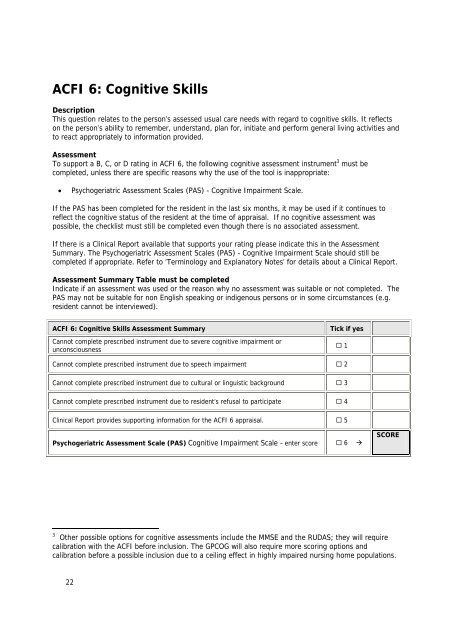PDF printable version of ACFI 6: Cognitive Skills
PDF printable version of ACFI 6: Cognitive Skills PDF printable version of ACFI 6: Cognitive Skills
ACFI 6: Cognitive SkillsDescriptionThis question relates to the person’s assessed usual care needs with regard to cognitive skills. It reflectson the person’s ability to remember, understand, plan for, initiate and perform general living activities andto react appropriately to information provided.AssessmentTo support a B, C, or D rating in ACFI 6, the following cognitive assessment instrument 3 must becompleted, unless there are specific reasons why the use of the tool is inappropriate:• Psychogeriatric Assessment Scales (PAS) - Cognitive Impairment Scale.If the PAS has been completed for the resident in the last six months, it may be used if it continues toreflect the cognitive status of the resident at the time of appraisal. If no cognitive assessment waspossible, the checklist must still be completed even though there is no associated assessment.If there is a Clinical Report available that supports your rating please indicate this in the AssessmentSummary. The Psychogeriatric Assessment Scales (PAS) - Cognitive Impairment Scale should still becompleted if appropriate. Refer to ‘Terminology and Explanatory Notes’ for details about a Clinical Report.Assessment Summary Table must be completedIndicate if an assessment was used or the reason why no assessment was suitable or not completed. ThePAS may not be suitable for non English speaking or indigenous persons or in some circumstances (e.g.resident cannot be interviewed).ACFI 6: Cognitive Skills Assessment SummaryCannot complete prescribed instrument due to severe cognitive impairment orunconsciousnessTick if yes 1Cannot complete prescribed instrument due to speech impairment 2Cannot complete prescribed instrument due to cultural or linguistic background 3Cannot complete prescribed instrument due to resident’s refusal to participate 4Clinical Report provides supporting information for the ACFI 6 appraisal. 5Psychogeriatric Assessment Scale (PAS) Cognitive Impairment Scale - enter score 6 SCORE3 Other possible options for cognitive assessments include the MMSE and the RUDAS; they will requirecalibration with the ACFI before inclusion. The GPCOG will also require more scoring options andcalibration before a possible inclusion due to a ceiling effect in highly impaired nursing home populations.22
<strong>ACFI</strong> 6: <strong>Cognitive</strong> <strong>Skills</strong>DescriptionThis question relates to the person’s assessed usual care needs with regard to cognitive skills. It reflectson the person’s ability to remember, understand, plan for, initiate and perform general living activities andto react appropriately to information provided.AssessmentTo support a B, C, or D rating in <strong>ACFI</strong> 6, the following cognitive assessment instrument 3 must becompleted, unless there are specific reasons why the use <strong>of</strong> the tool is inappropriate:• Psychogeriatric Assessment Scales (PAS) - <strong>Cognitive</strong> Impairment Scale.If the PAS has been completed for the resident in the last six months, it may be used if it continues toreflect the cognitive status <strong>of</strong> the resident at the time <strong>of</strong> appraisal. If no cognitive assessment waspossible, the checklist must still be completed even though there is no associated assessment.If there is a Clinical Report available that supports your rating please indicate this in the AssessmentSummary. The Psychogeriatric Assessment Scales (PAS) - <strong>Cognitive</strong> Impairment Scale should still becompleted if appropriate. Refer to ‘Terminology and Explanatory Notes’ for details about a Clinical Report.Assessment Summary Table must be completedIndicate if an assessment was used or the reason why no assessment was suitable or not completed. ThePAS may not be suitable for non English speaking or indigenous persons or in some circumstances (e.g.resident cannot be interviewed).<strong>ACFI</strong> 6: <strong>Cognitive</strong> <strong>Skills</strong> Assessment SummaryCannot complete prescribed instrument due to severe cognitive impairment orunconsciousnessTick if yes 1Cannot complete prescribed instrument due to speech impairment 2Cannot complete prescribed instrument due to cultural or linguistic background 3Cannot complete prescribed instrument due to resident’s refusal to participate 4Clinical Report provides supporting information for the <strong>ACFI</strong> 6 appraisal. 5Psychogeriatric Assessment Scale (PAS) <strong>Cognitive</strong> Impairment Scale - enter score 6 SCORE3 Other possible options for cognitive assessments include the MMSE and the RUDAS; they will requirecalibration with the <strong>ACFI</strong> before inclusion. The GPCOG will also require more scoring options andcalibration before a possible inclusion due to a ceiling effect in highly impaired nursing home populations.22
Checklist must be completed<strong>ACFI</strong> 6: <strong>Cognitive</strong> <strong>Skills</strong> Checklist1 No or minimal impairmentPAS= 0-3If no PAS assessment:No significant problems in everyday activities. Demonstrates no difficulties or only minordifficulties in the following - memory loss (e.g. may forget names, misplace objects), handlingmoney, solving problems (e.g. judgement and reasoning skills are intact), cognitively capable <strong>of</strong>self care.2. Mild impairmentPAS= 4-9If no PAS assessment:May appear normal but on investigation has some problems in everyday activities.Memory & Personal Care: memory loss <strong>of</strong> recent events that impacts on ADLs (i.e. needsprompting not physical assistance)Interests: not independent in chores/interests requiring reasoning judgement,planning etc (i.e, cooking, use <strong>of</strong> telephone, shopping).Orientation: disorientation in unfamiliar places3 Moderate impairmentPAS= 10-15If no PAS assessment:Has significant problems in the performance <strong>of</strong> everyday activities, requires supervision and someassistance.Memory: new material rapidly lost, only highly learned material retainedPersonal Care: requires physical assistance with some ADLs (e.g. personal hygiene,dressing)Orientation: disorientation to time and place is likelyCommunication: possibly fragments <strong>of</strong> sentences, more vague4 Severe impairmentPAS= 16-21If no PAS assessment:Has severe problems in everyday activities and requires full assistance as unable to respond toprompts and directions.Memory: only fragments <strong>of</strong> past events remainPersonal Care: requires full assistance with most or all ADLsOrientation: orientation to person onlyCommunication: speech disturbances are commonTick if yes 1 2 3 4<strong>ACFI</strong> 6 Rating KeyRATING A = yes to (item 1)RATING B = yes to (item 2)RATING C = yes to (item 3)RATING D = yes to (item 4)23



